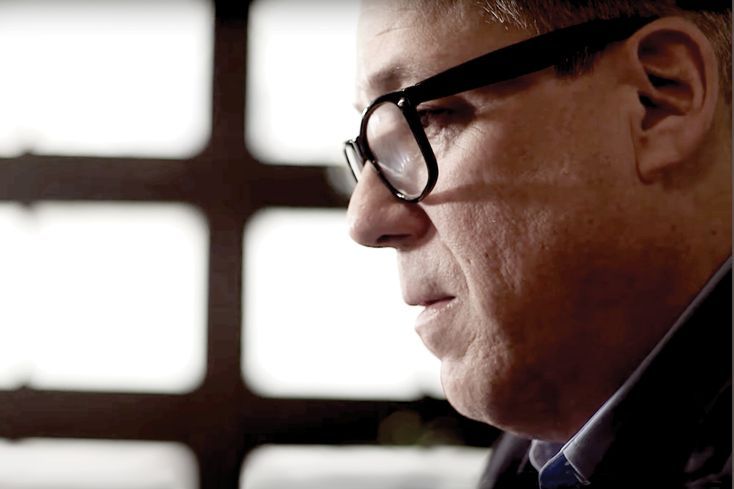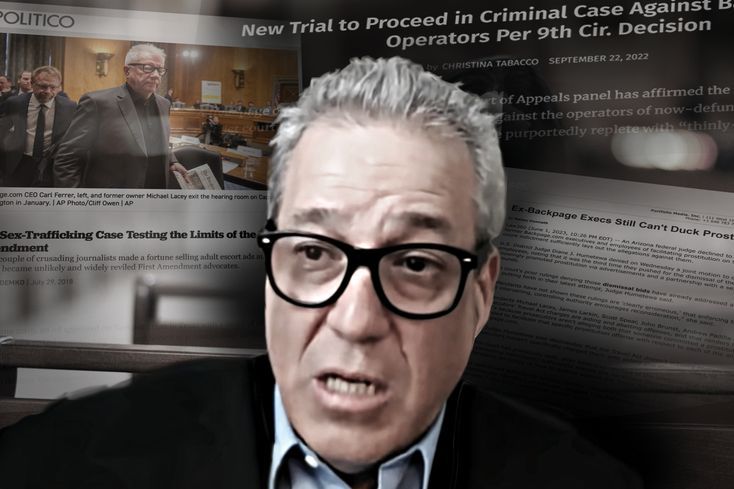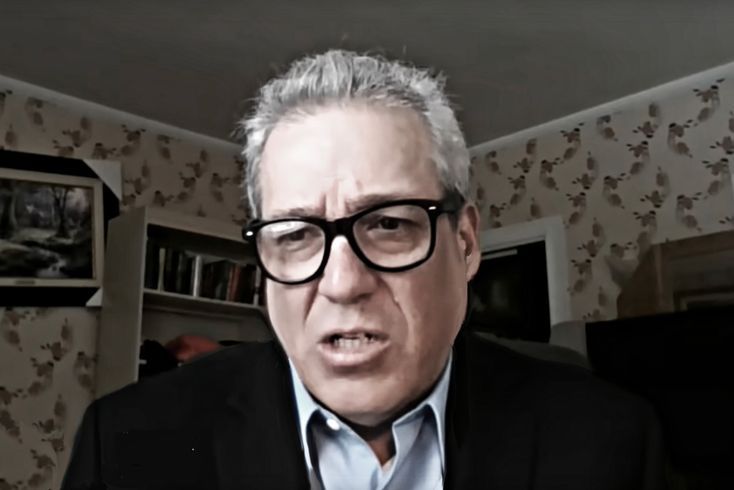Sex Ads. Profit. Pushback.
Tony Ortega’s entanglement with Backpage went well beyond his attempts to ridicule and discredit those who opposed the sex trafficking trade he profited from.

Early in his five-year tenure as Village Voice editor, Tony Ortega made his priorities clear when employees questioned his judgment for plastering eight naked women on the cover of the August 22, 2007, issue of the paper—signaling his commitment to continue publishing sex ads. His message to staff members objecting to his editorial decision was “if you’re going to be offended by something like this, then you shouldn’t work here.”
Within a month, Ortega fired his number two, managing editor Deborah Kolben, who was the twelfth woman to leave the paper within six months of his arrival as Voice editor in March 2007.
Voice owners Michael Lacey and James Larkin didn’t select Ortega for his editorial skills when they parachuted him into the job. He had a 10-year track record of doing the bidding of his “overmasters” as their self-described “merciless mercenary” at various alt weeklies in their New Times Media chain.
When they bought The Village Voice and rebranded New Times Media as Village Voice Media (VVM) in 2005, Lacey and Larkin had a definite business plan—and it didn’t involve journalism.
VVM owned both Lacey and Larkin’s chain of alt weeklies—which per a 2019 Wired article “were growing deader by the day”—and the Backpage.com sex ads website which, conversely, showed “tremendous upside potential.”
Soon, profits from Backpage “dwarfed the profits that VVMH’s [Village Voice Media Holdings] print publications were generating.” During Ortega’s tenure as Voice editor from 2007 to 2012, revenue from Backpage sex ads exploded—from $5 million in 2008 to $78 million in 2012.
Ortega knew where the money that paid for his salary came from, acknowledging in an October 2017 post that “the edit staff and I worked for Village Voice Media, which paid our salaries,” and mentioning “the salary I was paid by VVM.”
As public outcry against Backpage’s facilitation of child sex trafficking escalated—eventually prompting official investigations that led to Lacey and Larkin’s indictment on an array of criminal charges—Ortega did as he was told by his bosses. He fulfilled his role as the attack dog charged with silencing critical voices threatening the profits from Backpage, while defending his paycheck.
One such voice was CNN correspondent Amber Lyon whose January 2011 special investigation, “Selling the Girl Next Door,” was a harrowing exposé telling the story of 13-year-old Selena who was repeatedly sold for sex on Backpage.
Ortega’s response in The Village Voice was to accuse CNN of leading “the media’s mass paranoia over a nonexistent epidemic,” namely child sex trafficking, and call Lyon “one of the most visible enablers in this national fantasy.”
In a nod to what he considered Lacey and Larkin’s fiscal brilliance, Ortega wrote, “Seven years ago, the people I work for were smart enough to start Backpage.com.” In the same breath, he accused Lyon of wanting to “take down” Village Voice Media—meaning take away the profits from Backpage.com.
When Lacey, as VVM’s executive editor, ordered The Village Voice to do a takedown on the anti-trafficking campaign of Ashton Kutcher and Demi Moore, “Real men don’t buy girls,” Ortega complied.
In a June 2011 Voice article headlined “Real Men Get Their Facts Straight,” Ortega lamented that Craigslist had closed down their “adult classified business” under pressure from Congress. “The First Amendment was shouted down in the name of children,” he wrote. What Ortega actually objected to was not the end of Craigslist’s sex ads—which contributed to Backpage doubling its income from 2010 to 2011, from $26 million to $52 million—but that “Having Run off Craigslist, reformers, the devout, and the government-funded have turned their guns upon Village Voice Media.” He and his bosses knew Backpage was next.
Journalist Michelle Goldberg, who called Ortega’s arguments downplaying underage sex trafficking “seriously flawed,” wrote: “The Village Voice, which has been accused of profiting from underage sex trafficking, is out to prove that underage sex trafficking barely exists. ‘I remember the last couple of mass panics. Do you?’ wrote Tony Ortega, the paper’s editor in chief….”
As he had done with CNN’s Amber Lyon, Ortega retaliated against New York Times columnist Nicholas Kristof when he denounced Backpage in several columns in early 2012. One column, published on March 17 and titled “Where Pimps Peddle Their Goods,” gave a firsthand account from “Alissa,” who was first sold on Backpage when she was 16. Referring to the Voice retaliation piece written in part by Ortega that accused Kristof of waging an “uninformed crusade” against Backpage, the Times columnist wrote, “it’s really sad to see Village Voice Media become a major player in sex trafficking, and to see it use its journalists as attack dogs for those who threaten its corporate interests.”
Ortega has admitted his involvement with Backpage went beyond his role as an attack dog. In July 2011, he replied to a request for comment by a Scientologist who was looking into a lawsuit filed against Village Voice Media by an underage victim sold for sex on Backpage. In his response, Ortega acknowledged the depth of his entanglement with Backpage, stating, “Yes, we take 30 million ads a year from users at our Backpage.com website, and we have about 100 employees who moderate 20,000 ads a day.” Ortega conceded the ads involved “underage users”—meaning he knew that children were sold for sex on Backpage—but insisted it was only “a small number.” In fact, according to the indictment against Lacey, Larkin et al., “Many of the ads published on Backpage depicted children who were victims of sex trafficking.”
A statement by longtime Voice investigative reporter Wayne Barrett shed further light on Ortega’s active participation in Backpage. In a September 2011 interview, the veteran journalist stated, “Changes made by Ortega to the ad sales form have allowed the underaged ads to flourish.”
In spite of Ortega’s best efforts, there was no stemming the tide of public outrage, which included protests at Ortega’s alma mater in California when he was on campus to give a talk, and outside The Village Voice building in New York, with advertisers pulling their ads from VVM publications, further hurting the papers’ bottom line.
In fact, Ortega’s rabid defense of Backpage and attacks on its opponents backfired. An August 2011 letter to Backpage.com signed by 46 attorneys general charged the company with facilitating the “sexual exploitation of children, and prostitution.”
A press release announcing the AGs’ call for “an end to ‘online clearinghouse’ for human trafficking” quoted Ortega’s bluster as indication of Backpage’s culpability: “[I]n a June 29 article published nationally by the Village Voice, the corporation criticized those concerned about child sex trafficking as ‘prohibitionists bent on ending the world’s oldest profession,’ acknowledging that, as a seller of adults services ads, ‘Village Voice has a stake in this story.’…Many state attorneys general believe that Backpage.com is attempting to minimize the impact of child sex trafficking because they fear it will turn attention to the company’s robust prostitution advertising business.”
This development was so damaging that when the National Association of Attorneys General announced it was investigating Backpage, it torpedoed a $150 million deal Lacey and Larkin had to sell Backpage, which by then “was causing too many headaches” according to Wired. Lacey and Larkin were livid.
When they realized Ortega’s obsessive anti-Scientology blogging on The Village Voice website exacerbated public and official scrutiny of Backpage, Lacey and Larkin fired him. According to Mark Rathbun, whom Ortega confided in upon his firing in September 2012, his severance package included a two-year buyout deal in exchange for his silence on what he knew about Backpage.
Soon after they fired Ortega, Lacey and Larkin unloaded their newspaper chain, retaining only the profitable end of their business, Backpage.com.
Official investigations of Backpage marched forward. In January 2017, a U.S. Senate investigation revealed that Lacey, Larkin and their Backpage operators ran an elaborate scheme to conceal that Backpage ads for “adult services” facilitated prostitution and the selling of children for sex. Manipulating the ad content—by automatically filtering and manually removing key words indicative of prostitution and the trafficking of underage victims—fatally undermined Lacey and Larkin’s defense that they weren’t responsible for third-party content their site merely hosted. In 2011, Larkin had cautioned against Backpage editing practices being made public: “We need to stay away from the very idea of ‘editing’ the posts, as you know.” They didn’t.
The 20-month Senate investigation and its detailed report paved the way for the prosecution of Lacey, Larkin and some of their co-conspirators, who face trial for conspiracy, facilitating prostitution and money laundering.
Tony Ortega has kept up his end of the deal with his bosses of 17 years. He is still silent about Backpage.com.
Arizona Republic reported at 6:08 p.m. MT August 1, 2023, that James Larkin died by suicide July 31.


